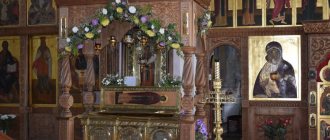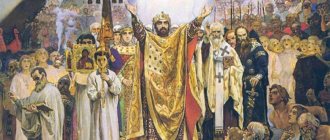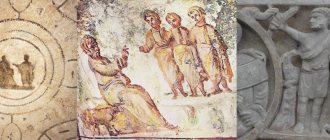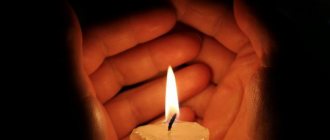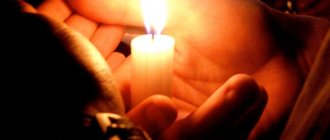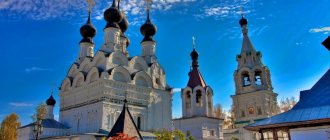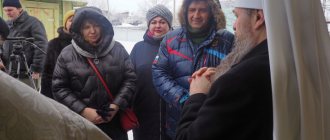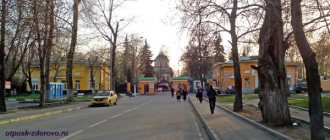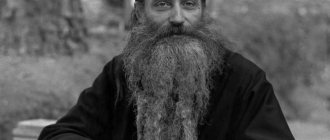Seraphim's childhood
The future elder was born on August 1, 1894 with the name Dimitri Aleksandrovich Tyapochkin. He had a difficult fate, but went through all the trials, maintaining ardent faith in God and serving Him.
Origin and birth
Dmitry Alexandrovich was born into a family of nobles as the sixth child. He was born and lived in the city of Nowy Dvor (Poland). At baptism the boy was named after the Great Martyr. Dmitry Solunsky. He grew up in a large, friendly family, where his parents were virtuous believers and gave their children a good example to follow.
Family
Father, Alexander Ioannovich, a retired colonel, was a court councilor, and later the head of the telegraph in Yekaterinoslav (Dnepr). Mother, Eleanor Alexandrovna, came from the noble Makovsky family, a noble and wealthy family. Both of them were true believers, had love for God and people, and showed a kind, warm attitude towards everyone around them.
Pious and God-fearing parents had a huge influence on Demetrius. Already at an early age, the boy showed a keen interest in church, divine services, and reading the Holy Scriptures. He knew the life of St. Seraphim by heart and loved the saint with all his soul, always revered him as his spiritual mentor. The boy remembered the year 1903 for the rest of his life, when Seraphim of Sarov was glorified as a saint.
One day little Dimitri was taken to the temple. He was so impressed by the singing of the students of the religious school that he asked his father to send him to this institution. The boy's wish resonated with his parents. When he was seventh year old, they sent him to study.
Demetrius had no priests in his family. Konstantin, the eldest of the brothers, served as a cadet under Tsar Nicholas 2, he was shot in 1922. Alexander, the middle brother, died during the revolutionary events. Elena and Maria, the eldest of the sisters, became housewives, and Nadezhda devoted herself to raising children.
“I grieve for myself, I grieve for my children, for my flock”
Father Seraphim.
Photo from the website https://butyr-sloboda.moseparh.ru/ In 1941, Dmitry’s father was arrested and sent to a camp for 10 years for “religious agitation.” But he continues to serve in the camp: he confesses, baptizes, performs funeral services, even performs weddings. He slowly performs the service by heart, answering a variety of questions. The prisoners not only kept the secret of his ministry, but also former criminals created “guards” for the priest from among them.
While in exile, the priest wrote to his relatives: “My soul grieves to death. Remembering the Gethsemane feat of Jesus Christ, I find consolation for my grieving soul... I grieve, I grieve heavily; I grieve for myself, I grieve for my children, my relatives, I grieve for my flock, I grieve for my spiritual children, I grieve for those who love me, remember me and are awaiting my return now. But what I fervently and fervently prayed to the Lord for happened, “let this cup pass from me.”
But it was precisely during these difficult years that Fr. Dmitry felt that he, like a cup, was gradually, drop by drop, filled with grace-filled love for God and people given from above.
And at the same time he becomes simple and completely unaware of the evil that was inflicted on him.
The time of imprisonment was drawing to a close. The investigator asked Dmitry's father about his plans after his release. The priest replied: “I am a priest - I intend to serve.” “Well, if you serve, then stay with us a little longer,” the investigator reasoned and added five years. O. Dmitry was offered to leave Christ quietly. He could say: I’ll get settled somehow. But oh. Dmitry answered like a confessor.
“I was burning with the desire to return to my native place, with the desire to see my relatives, dear ones and friends, but, alas, I was assigned to the Krasnoyarsk Territory,” wrote Fr. Dmitry in a letter to his spiritual daughter. -... My old age is not adapted to such a life. Winter is approaching, harsh and long. Thy will be done. I believe that the Lord is always with me, His servant. I believe that He will not leave me.”
Teenage years and early life
Already in the early years of his life, Dimitry Tyapochkin firmly knew his purpose - to serve God and people. And all subsequent years, he did not retreat one step from his path, entrusted to him from above.
Spiritual education
In 1911, Dimitri entered the theological seminary located in the city of Kholm in southeastern Poland. Here he finally made his life choice in favor of pastoral ministry. Demetrius did not participate in the games and entertainment of the seminarians, he loved to read the Gospel for a long time, he was silent and serious. In 1917, after graduating from the seminary, the young man continued his spiritual and theological education at the Moscow Academy, which at that time had a significant influence on the development of philosophical and religious thought in the country.
The following year, 1918, had dire consequences for all people, and, first of all, clergy and believers. The Council of People's Commissars issued a decree on the separation of the church from state institutions. They began to close religious educational institutions, house churches, and cancel lessons of the Law of God in schools. At the MDA, classes lasted until the spring of 1919, after which the students were sent home indefinitely.
Personal life
After everything that happened, Dimitri returned to Yekaterinoslav. In the village Mikhailovka offered him a position as a geography teacher. There the young man met his love, his future wife Antonina, a mathematics teacher. A young couple was preparing for their wedding, but an unexpected misfortune interrupted their plans. Dmitry came down with typhus and fought for life for almost a year. They were able to get married only in 1920.
In the same year, in the Tikhvin women's monastery (Ekaterinoslav), Dimitri was ordained a deacon, and soon - a presbyter. The beginning of the pastoral ministry of Fr. Demetrius took place in the same diocese. This was a real test for the young family. Two of his sons died from the famine that reigned in Ukraine at that time.
The couple are survived by three daughters:
- Nina (eldest) - grew up, worked as a head physician, died in 1994.
- Lyudmila - was a nurse, passed away in 1995.
- Antonina - lives in the Zhytomyr region.
The beginning of priestly service came during the difficult years of fighting against God, persecution of the church, organized by the godless government. Subsequently, his wife Antonina died of tuberculosis (1933).
Church service
Father Dimitri was appointed to the position of dean of the Solonyansky district in the Dnepropetrovsk region. (1921 – 1936).
This was the most difficult time for the church:
- destruction and desecration of temples and shrines;
- persecution of church pastors;
- persecution of believers;
- the emergence of renovationists, self-saints, etc.
More than once attempts were made on the life of Father Dimitri. One day, at Epiphany, he was called to a neighboring village to conduct a water blessing service in place of the sick abbot. Along the road the horses suddenly began to gallop. Father lay down on the bottom of the cart, afraid of falling. And at that moment bandit bullets whistled overhead.
The horses stopped only at the porch of the church, but it was already safe here. Thus, God miraculously saved the future elder and ascetic of the Russian land. The rector of this temple, as it turned out, had been arrested the day before. They wanted to deal with Father Dimitri on the way to church.
Easter in the camp
After the link.
Photo from the website mgarsky-monastery.org At the site of the link Fr. Dmitry there was a functioning temple nearby. One day on Easter, an event occurred that the priest always talked about with tears. Father Dmitry entered the church, suddenly the rector approached him, invited him to the altar, gave him vestments, and they served the Easter service together.
As it turned out, the rector of this temple, Father Mitrofan, had a revelation in a dream that the shorn prisoner in a padded jacket standing at the door of the temple was a priest, and the order was to invite him to serve. After this service, Father Mitrofan repeatedly invited the exiled priest to concelebrate with him, risking his own position and freedom.
Mature age
At that time, a church schism, caused by the godless government, spread. The “Living Churchers” seized churches, deceived people, assuring them of their truth and legality. Father fought against heresy as best he could, for which he was persecuted and persecuted.
Arrest and exile
Father Dimitri, when the churches in his deanery were closed, began to serve secretly, moving from church to church and constantly hiding. The authorities found out about this, and surveillance began on the priest. In 1941, he was arrested and during interrogation, all the places of his ministry were listed, starting from the 30s. O. Dimitri was sentenced to 10 years of imprisonment and sent to one of the Kazakh camps.
In the camp, the priest did not stop his pastoral service for a minute:
- confessed;
- baptized;
- saw him off on his last journey;
- conducted soul-saving conversations with cellmates.
When asked by the camp authorities what he would do after returning from exile, Father Dimitri replied that he would be a priest. Because of this, he received an additional 5 years of exile in the Krasnoyarsk Territory on the river. Igarka.
Return to Pastoral Ministry
In 1955, Father Dimitri was released. He returned to Dnepropetrovsk and could now devote himself entirely to pastoral service. By this time, there was nothing binding him anymore - his daughters had grown up and had families. But take about. No one dared to serve Demetrius in the diocese; they were afraid of the authorities.
Only Bishop Jerome invited the priest to serve as a cleric in the Peter and Paul Church in Kuibyshev. In 1956, an incredible event at that time took place, which shocked the minds and hearts of people - Zoino’s standing. Father Demetrius was the priest who managed to remove the face of St. from the hands of the petrified girl. Nicholas. The authorities again began persecuting him and ordered him to hide the icon.
Subsequently, they were banned from serving in the Dnepropetrovsk diocese, where Fr. With the blessing of Bishop Joasaph, Demetrius became rector of the cathedral. People immediately sensed in the new shepherd an unusual person, an ascetic and a saint of God, and were drawn to him. They were attracted by his heartfelt, heartfelt sermons and long nightly confessions.
Looking for a new place about. Dimitri came to Moscow for the blessing of the Patriarch. Waiting for his fate to be decided, he lived at the station for a whole month, until he met Bishop Leonid (Polyakov) from the Kursk-Belgorod diocese in the reception room of His Holiness. He called him to him, and the priest went to serve in the village. Sokolovka near Belgorod.
Monastic tonsure
Having long wanted to serve God in a monastic form, Fr. Demetrius submitted a petition to Bishop Leonid. And so in October 1960, Archpriest Demetrius was tonsured with the name Seraphim in honor of his beloved saint - St. Seraphim, the Wonderworker of Sarov, and the next year he was elevated to the rank of hegumen. From October 1961 until his death, the priest was rector of St. Nicholas Church in the village. Rakitnoye, Belgorod region.
At first it was very difficult for the priest here. The temple is dilapidated, there are no living conditions, no one goes to services. The first few nights Fr. Seraphim slept on the bare cold floor, but then someone took pity and brought an old bed.
The church was in a deplorable state:
- broken windows;
- rotten floor;
- plaster falling off the walls.
With the help of God and his spiritual children, the priest gradually restored St. Nicholas Church. The Lord sent everything through the prayers of the elder - helpers, donors, builders. Soon a parish was formed and life began to boil.
Everything was done only with the blessing of the priest. His assistant was Priest Gregory, who, due to a spinal injury, could not move independently. But the priest gave him a salary, and soon he stood on crutches, began to fulfill his duties, sing in the choir, and carry out other labors in the temple. Father Seraphim completely devoted himself to people, performed enormous spiritual and physical feats, and hid God’s gifts from everyone - insight, the gift of healing.
Father was often visited not only by ordinary people, but also by:
- bishops;
- monks;
- priests;
- students of religious institutions.
In the person of the elder they found a loving and experienced confessor and mentor. K o. Schema-Archimandrite Kirill (Pavlov) visited Seraphim more than once. The elder sometimes wrote letters and congratulated his spiritual children on church holidays. Based on these remaining testimonies, as well as sermons in the church, individual statements, one can judge the high spiritual dispensation of Father Seraphim.
The hierarchy of the Russian Orthodox Church highly noted the merits of Fr. Seraphima:
- 1970 - elevated to the rank of archimandrite;
- 1974 - the right to wear the 2nd cross with decorations was given;
- 1977 - awarded the Order of St. book Vladimir 3rd class;
- 1980 - Order of St. Sergius of Radonezh, 3rd Art., Patriarchal Charter in honor of the 60th anniversary of the ministry of the church.
Father Seraphim accepted all awards received with gratitude. But he did not attach much importance to earthly glory.
last years of life
Father was eighty-eight years old. He began to noticeably weaken, the backbreaking work and old age taking their toll. Before this, the elder experienced pneumonia, which also undermined his health. Although the years of his earthly life were coming to an end, outwardly he was even and calm.
His soul constantly prayed. Thanks to his amazing memory, Father Seraphim could mentally go through the entire liturgical circle without looking at the books. Knowing that his days were numbered, the priest commanded that he be buried next to his cell, near the altar walls of the temple.
Soon, icons were painted at this place in the niches of the walls:
- Rev. Seraphim of Sarov;
- St. Vmch. Demetrius of Thessalonica;
- St. martyr John the Warrior.
A serious illness overtook Father Seraphim in the last days of Lent. Every day the old man became worse and worse, his strength was gone. Bishop Chrysostom together with other clergy unctioned the elder. Until his last days, he constantly took communion, prayed, and his weakened hand often raised to make the sign of the cross. It was difficult for the elder to speak, but his consciousness remained clear.
He left on the next day of the bright holiday of the Resurrection of Christ, April 19, 1982. The authorities canceled regular buses to the Belgorod region and did not sell train tickets so that those wishing to attend the funeral would not be able to get there. But a lot of people still gathered. Genuine grief for their beloved and dear father was written on their faces.
“You brought something dry, a skeleton”
To the village of Rakitnoye o. Seraphim came to serve in 1961, after 15 years of camps and exile. The head of the St. Nicholas Church, Maria, dissatisfied with the unrepresentative appearance of the new rector, reprimanded and even beat Ekaterina Luchina, who was fussing about the new priest: “You brought a dry one, a skeleton!”
Soon the elder Maria died. She was coming home from work when she had an attack, she fell face first into the dirt and never got up.
There was no heat in the house where the priest was settled; he sat on the floor and dipped crackers into a tin can. And nearby, in the temple, snow was falling from the broken dome.
There was no electricity, no candles. Divine services were allowed only at night, so as not to distract people from work on the collective farm. Father Seraphim, who knew the service by heart, served in complete darkness, and always delivered a sermon.
Later his grandson asked him: “For whom were you speaking?” The priest replied: “But there could be someone in the darkness. I spoke for them.”
Writing activity
Although the elder himself did not write books, his life, amazing biographical facts and exploits formed a vivid plot in many spiritual works and films.
Here are the most famous of them:
- "The unquenchable light of love." The author is Hierodeacon Sophrony (Makritsky). The book outlines the life path of the elder, testimonies about him from people of various ranks and ages - laymen, monks, bishops, priests.
- “Standing”, Archpriest Nikolai Agafonov. Sretensky Monastery Publishing House, 2015. It is based on the story of the petrified girl Zoya, who decided to dance with the icon of Saint Nicholas in her hands. According to legend, it was Fr. Seraphim was the same priest who managed to take the face of the saint from her frozen hands.
- “Righteous of Our Days”, author - Father Nikolai Germansky. The book was written by the rector of the temple in Rakitnoye, where many people who knew the elder come. O. Nikolai collected together their memories and verified evidence of healings.
About the book “Standing” by Archpriest Nikolai Agafonov
Essentially, this book is a fictional story about Zoya's standing. But Father Nikolai conducted his own investigation into the sensational story. He came to the conclusion that the girl’s standing lasted at most 3-4 days, and not as the legend says (from New Year to Easter).
The author proves all this and describes it in detail, telling this story as he sees it. Father Nikolai talked with many eyewitnesses. Based on this evidence, he wrote a book and outlined his view of the events of long ago.
“Unquenchable Light” by Hierodeacon Sophrony (Makritsky)
The book tells about the shepherd of our days, Archimandrite Seraphim Tyapochkin, who has become for us an example of the love of Christ. People who knew the priest testify to his divine meekness and humility, unconditional love for every person. He healed and consoled the souls of people with prayer and kind pastoral words, and was gifted by God with the gift of clairvoyance and miracles during his lifetime.
This book contains testimonies about the priest from a variety of people who in one way or another crossed paths with the elder on their life path. His spiritual children, priests, and bishops remember him with warmth and reverence. Every word of the book is permeated with love for the elder, which was sold throughout Russia in numerous editions, gaining universal fame. In 2013, the book became a laureate of the All-Russian writing competition “The Burning Bush”.
Where the polar bears are
It became known in the camp that “prisoner Tyapochkin” served in the temple. O. Dmitry was summoned to the authorities and asked to “renounce God.” After the refusal of Fr. Dmitry was exiled further along the Yenisei, to a lumber yard, “to where the polar bears are,” as he later said. The prisoners said goodbye to Fr. Dmitry, because they knew that those who were disliked by the camp authorities were sent there to die, and no one had yet managed to return.
“They carried us by water, then threw us ashore, where there was only sky, snow and forest,” the priest recalled. - Thank God that since childhood I learned to eat little, I’ll eat a crumb with prayer and refresh myself, while others died from malnutrition. I was so weak that I couldn't even lift anything. Then they told me: you, priest, guard the forest so that it does not get stolen. Who should steal it? I realized that I was doomed to death, to be torn to pieces by beasts...
And then one day I saw bears coming towards me. I raised two crosses.
I was standing with these crosses, the bears came very close to me and stopped. They looked at me, started looking around and left. So I was saved by crosses.”
Healing the Paralytic
One day, after the end of the service, a seriously ill man was brought to the temple on a stretcher, who could not move at all. The priest slowly approached the sick man, stayed near him and brought the altar cross and oil from the altar. Having prayed over the sufferer, the elder anointed him with blessed oil and overshadowed him with the cross. At the same moment, the relaxed man felt strength in his muscles and sat down. He left the church on his own feet, and his family only helped him a little. For some time, the healed man and his companions lived near the temple, each came to pray, and soon returned completely to life. An eyewitness to this incident was priest Nikolai Khokhlov.
Reply to three young people
With parishioners.
Photo from the site pravlife.org O. Seraphim hid his spiritual gifts: insight, the ability to heal, which he certainly possessed, according to the word of the Lord: “in My name they will cast out demons; they will speak in new tongues; they will take snakes; and if they drink anything deadly, it will not harm them; They will lay hands on the sick, and they will recover” (Gospel of Mark, 16:14-18).
The gift of insight helped him to extremely reduce the time of conversation with visitors. The elder walked among people on the street or in a temple, and, approaching someone, gave an answer to a question that had not yet been asked.
Once, to a young man, a candidate of physical and mathematical sciences, who asked the elder: why no one now becomes a priest (approximately 1975), the priest answered with a smile: “Here you go.” The questioner was none other than the current rector of the Orthodox St. Tikhon's Humanitarian University, Archpriest Vladimir Vorobyov .
The same advice was given to two more guests who were then sitting at the priest’s table - employee of the Rublev Museum of Art History Alexander Saltykov and graduate of the Moscow State University Physics and Mathematics Nikolai Likhomanov. Archpriest Alexander Saltykov today is the rector of the Moscow Church of the Resurrection of Christ in Kadashi, dean of the Faculty of Church Arts of PSTGU, senior researcher at the Central Museum of Ancient Russian Culture and Art named after. Andrey Rublev. And Nikolai Likhomanov is Bishop Veniamin of Rybinsk and Danilovsky .
"I don't heal, I pray"
Over time, the “monk in the world,” whose prayer helps out of the most difficult circumstances, became known far beyond the borders of the Belgorod region. Desperate people came from everywhere, bringing sick children and relatives.
One day, a girl jumped out of the crowd of people to the priest, who was going to church for a service, with the words: “Heal me, Father Seraphim!” Father stroked her cheek and said: “Baby, I don’t heal, I pray.”
“My all-healing power is Christ”! - the Great Martyr Panteleimon exclaimed in the days of his earthly life, and I, unworthy, too,” said Fr. Seraphim. – How many times have you had to correct your appeals with a request to “be healed?” I'm just praying. And if through prayer the sick receive healing, the grieving receive consolation, then this is from the Lord. ...First of all, the patient’s faith and repentance are needed.”
But oh. Seraphim knew from experience that without help from above, a person cannot truly see his sins, nor sincerely, from the heart, repent.
Therefore, he himself, with tears, prayed to God that the Lord would send grace to those who had sinned. In communication with Fr. The man gradually began to open up as Seraphim, he himself took off his mask, because one could only be with him, and not seem to be.
With all his being, he called you to live, to be alive, and gave you the spark of this life. People left him warmed, transformed by his peace and love.
Confessing, Fr. Seraphim did not give penance, did not give severe reprimands, did not prescribe special prayer rules or fasts, but he knew how to make a person feel his value in the eyes of God, to somehow convey to him God’s love, the news of God’s love for him personally. And in this a person found strength for life, for change.
